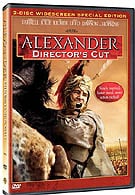Oliver Stone obviously has a lot of passion for the story and persona of Alexander – too much passion, perhaps. No man’s life can be summed up in a feature length film, particularly one whose life is so full of incredible military and social achievements. Stone, nevertheless, seems to have been hell bent on cramming so much myth and history of the man into one film that the result is a bloated, confusing and horribly disappointing epic. A beautiful disaster, Oliver Stone’s passion shines in his personal cut of Alexander, yet the result is still a tragically flawed film. The history of Alexander is a massive one. Dead before the age of 33, the second generation monarch of Macedonian Greece at one time ruled a vast majority of the known world, an empire which he himself built by magnificently conquering and incorporating everything from tribal villages to powerful empires. Even at a young age his strategies and boldness in war resulted in some of history’s greatest battles and most glorious victories. His contemporaries and teachers included Ptolemy and Aristotle. His was a legendary life.
Oliver Stone’s captivation by those exploits of the true-life legend is understandable. His choices in portraying that life are not. The story is told as a narrative from the point of view of Ptolemy, one of Alexander’s generals and closest friends. An old man, he recounts for his scribes his account of Alexander’s life. Anthony Hopkins is absolutely perfect in his portrayal of the wizened old general, but the narrative he gives serves as a poor guide for the film. His recurring presence in the movie is meant as a compass to keep audiences on track, but the moments feel forced and they serve more to confuse than to conduct the story.
Within the confines of Ptolemy’s entrancingly muddy tale, the film begins and ends with the death of Alexander. Everything in between is a cinematic cacophony of time jumping and flashbacks. Rather than work through the challenges of presenting Alexander’s life in a linear fashion, Stone chooses to jump forwards and backwards in time, tossing in seemingly random moments in Alexander’s life to counterpoint or compliment the previous scene. The result is a train-wreck series of battles and emotional diatribes that are wearisome to watch.
To further complicate matters, Stone attempts to stitch together his story by heaping on excessive amounts of ancient Greek myth. As if worried you might miss the uncanny parallels of Alexander’s life to those of mythical heroes, the director pours on mountains of obscure and unnecessary imagery. It was so obscure that the movie was two thirds over before I finally figured out what the director was trying to do. It was a thought Mr. Stone, but too little too often.
Another aspect that failed to please was Stone’s incorporation of the convoluted love life of Alexander. Despite claims that this director’s cut focused less on the man’s bisexual tendencies, there’s still plenty left in the film to tell that side of the story. I understand that move. Had he left out the relationships altogether he most likely would have had every homosexual/bisexual interest group banging down his door complaining (a vast majority of them were anyway – c’mon folks it’s only a movie not a sexual manifesto).
The movie does its best to incorporate love as a major theme by including all of Alexander’s many complicated romantic relationships (including his mother, his wife, his best friend and his eunuch slave). The problem is that there are already too many major themes at work and the added burden of the relationships simply results in too much to try and absorb. You can only tell a story from so many perspectives before things become too complicated to watch.
For all its many tiring flaws Alexander is still a beautiful disaster. The epic battles of Braveheart and Troy and the gorgeously designed sets of Gladiator and Kingdom of Heaven have nothing on the brilliance and splendor laid forth in Alexander. It is truly epic in nature, carrying us literally half-way around the world in two hours through an era that died millennia ago. Each set, costume, prop, backdrop and battle is stunningly rendered. I’m reminded of the grandiose classics like Cleopatra and The Ten Commandments. In recent years only the Lord of the Rings has achieved this kind of ambitious epic quality.
Your Daily Blend of Entertainment News
The performances in Alexander are also amazing, despite awkward periodesque dialogue and hazy accents that don’t seem quite right (it would seem Stone set the cast down for a showing of Braveheart and said “everybody pick one”). Colin Farrell puts forth a formidable Alexander. He wades through Stone’s quagmire of emotional and historical concepts to create an embodiment of Alexander that is worthy of the legend. Angelina Jolie, Rosario Dawson and Val Kilmer all find themselves equally burdened with underdeveloped characters, but each sinks their teeth into the role and churns out scene after scene of powerful (if not slightly shallow) emotion. No doubt Stone offered his actors ample guidance to help fill in the gaps in his Swiss cheese script, but final kudos must go to the actors.
Another tragic loss is the movie’s music. Sensational and moving, Vangelis’ score is as epic as one could hope for yet horribly mismatched. Unto itself it is a fantastic cinematic composition but it belongs to some other film, not Alexander. The expressive and ethereal music rarely captures the harsh and visceral imagery. Stone should have known better. Synthesized trumpets and voices are not worthy for the portrayal of one the greatest battles in human history.
In the end, Oliver Stone has brought together all the puzzle pieces for a truly great and extraordinary epic film, but he cast aside the picture on the box and put them together how he saw fit. The result just isn’t pleasant to look at. I sure that his changes from the theatrical release of Alexander to this director’s cut resulted in a slightly better film, but that leaves a lot of ground to cover before Alexander can be considered enjoyable to watch. Perhaps it’s ironic. Alexander was Great. His movie is anything but. The manner of Alexander’s DVD release is, like the film, slightly confusing. Let me try and set the record straight.
First off, don’t expect to find the theatrical version amongst the features in this package. The original cut of the film was also released this week but as a separate disc set. See, Mr. Lucas, some people aren’t afraid to show both the original and the updated. Oliver’s stock just went up a point or two.
Second, for those of you who, for whatever sad reason, prefer full screen versions over wide screen (you know, with the letter box black bars on the top and bottom of the TV), you won’t be able to get the 2 disc edition. Oddly enough you can only get the single disc (feature film plus commentary) version. Don’t ask me why.
So, once you’ve narrowed down all your options and found the cut/screen-size you prefer we can continue. If you aren’t considering the Director’s Cut 2 Disc Special Edition you can stop reading as that’s the version being reviewed here. Everyone else, forge ahead.
There’s some irony to the cover of the DVD. The biggest complaints critics had about the original cut of the film included lack of inspiration, poor pacing, and insufficient action. What words are blazened across the front of the box? “Newly inspired, faster paced, more action packed!” So much for not caring what the critics say, eh Mr. Stone?
The first disc of the set contains only the feature film itself. It has a commentary track by Oliver Stone himself, but I’ll get to that later. The rest of the features are contained on the second disc and they make for a very short list. I guess when your movie recovers less than half of your production budget at the box office, the folks at the studio aren’t all that keen to sink a lot of money into the DVD.
The making-of featurette for Alexander takes a somewhat guerilla style approach to the concept of going behind the scenes. There are no glossy studio interviews or refined on-set camera footage to be seen here. Instead you’re treated to more of a fly-on-the-wall perspective with completely candid and often impromptu interviews with the cast and crew.
I’ve never enjoyed hearing actors talk about a project this much before. The on-the-spot Q&A sessions are raw, unfettered and unpolished; thoroughly entertaining, despite the occasional moments of queasiness induced by the shaky hand-held camera. The only draw back is the fact that the three parts of the feature together run nearly two hours long. The rawness gets a little tedious after awhile. I recommend taking a short break between each segment.
Most behind-the-soundtrack features involve the director and composer hovering feverishly over pages of music as a full orchestra retunes and prepares for the next take. Not so with Alexander. A very brief, very tranquil interview with composer Vangelis yields nothing more than a view into his quiet studio in Greece where he and his synthesizers put together the entire score. It’s impressive to see one man do so much. Too bad his score didn’t fit the movie.
The final major bonus feature is the commentary track by Oliver Stone. After finishing the film this was what I looked forward to the most. How will the man explain this film that, in my mind, failed the most basic acid tests of directing?
In fact, he doesn’t, but he does unwittingly expose the reasons why his film was so muddled. Stone spends most of the commentary reflecting on the history and philosophies behind the story he’s trying to tell, many of them important details that aren’t brought to light in the film itself. He reveals his overzealous passion for the material while exposing the lack of attention to the kinds of hard choices that separate the good films from the bad. In short, he simply tried to do too much.
Listening to Stone’s gruff yet soothing voice dispensing minute after minute of repetitive fact and historical rumination is like being tired and trying to go to sleep after having consumed serious quantities of caffeine. You want to doze off but an incessant mental droning in your head keeps you painfully alert. If you manage to stay awake you’ll hear everything you would expect from Oliver Stone. He takes political jabs at the Bush administration while spooning out copious complaints about critics and lobbyists who judged him for his treatment of Alexander’s sexuality. Actually the sexuality brought out one of his rarer moments of weirdness where he describes Alexander as a tri-sexual. Apparently having a thing for men, women and eunuchs is some kind of a lusty trifecta in Stone’s book.
The icing on the cake is a moment in the commentary where, chuckling to himself, Stone admits to his audience: “What can I say? This isn’t Braveheart!” You can say that again, Oliver. At least Gibson’s flick was watchable. To his credit the director spends plenty of time praising his cast and creative crew with well deserved words. The most honest thing he has to offer is a confession that “Any failings in the film are mine.”
Given that Stone’s commentary is, by far, the most interesting feature, and since it comes on the single disc version of the DVD which is the only version available for rent in most stores, it makes the decision to rent or buy Alexander a simple one. In the name of all that is good in this world, RENT it!

